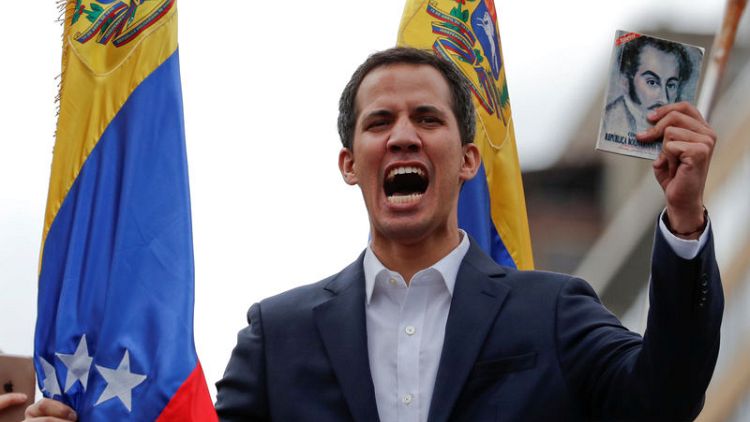By Mayela Armas, Angus Berwick and Corina Pons
CARACAS (Reuters) - Backed by hundreds of thousands of protesters and the support of the United States, Venezuela opposition leader Juan Guaido declared himself interim president on Wednesday, calling for free elections to end the rule of socialist Nicolas Maduro.
In a statement minutes later, U.S. President Donald Trump recognised Guaido as Venezuela's legitimate interim president, and a Canadian official said Canada was preparing also to add its support.
Demonstrators clogged avenues in eastern Caracas, chanting "Get out, Maduro" and "Guaido, Presidente," while waving national flags. Police fired tear gas to disperse protesters in several areas, after a rally on Tuesday evening left a reported four people dead.
The 35-year-old Guaido has energized the opposition with a campaign to declare Maduro a usurper after elections last year widely regarded as fraudulent, and has promised a transition to a new government in a nation suffering a hyperinflationary economic collapse.
"I swear to assume all the powers of the presidency to secure an end to the usurpation," said Guaido, recently elected head of congress, before an exuberant crowd.
Guaido's declaration takes Venezuela into uncharted territory, with the possibility of the opposition now running a parallel government recognised abroad as legitimate but without control over state functions.
Maduro's administration could also crack down on Guaido. It has previously accused him of staging a coup and has threatened him with jail. Guaido's political mentor, Leopoldo Lopez, was arrested in 2014, one of dozens of opposition activists and leaders the government jailed for seeking to overthrow Maduro through violent street demonstrations in 2014 and 2017.
Guaido has said he would be willing to replace Maduro with the support of the military and to call free elections. Maduro started a second term on Jan. 10 following a widely boycotted election last year that many foreign governments described as a sham.
"I will continue to use the full weight of United States economic and diplomatic power to press for the restoration of Venezuelan democracy," Trump said in his statement.
The Trump administration could impose sanctions on Venezuelan oil as soon as this week, according to sources.
ARMED FORCES
Any change in government in Venezuela will rest on a shift in allegiance within the armed forces. So far, they have stood by Maduro through two waves of street protests and a steady dismantling of democratic institutions.
The constitution says if the presidency is determined to be vacant, new elections should be called in 30 days and that the head of congress should assume the presidency in the meantime.
The pro-government Supreme Court has ruled that all actions taken by congress are null and void.
"We need freedom, we need this corrupt government to get out, we need to all unite, so that there is peace in Venezuela," said Claudia Olaizola, a 54-year-old saleswoman near the march's centre in the eastern Chacao district, a traditional opposition bastion.
In a potent symbol of anger, demonstrators in the southern city of Puerto Ordaz on Tuesday toppled a statue of late socialist leader Hugo Chavez, broke it in half and dangled part of it from a bridge.
A 16-year-old was shot dead at a protest on Tuesday in western Caracas, according to rights group Venezuelan Observatory of Social Conflict. Three people were shot dead on Tuesday night in southern Bolivar City during looting that followed a nearby protest, Bolivar state governor Justo Noguera said.
Maduro has presided over Venezuela's spiral into its worst-ever economic crisis, with hyperinflation forecast to reach 10 million percent this year. Some 3 million Venezuelans have fled abroad over the past five years to escape widespread shortages of food and medicine.
"We've come out to support the opposition and preserve the future of my son and my family, because we're going hungry," said Jose Barrientos, 31, an auto parts salesman in the poor west end of Caracas.
(Reporting by Corina Pons, Angus Berwick, Mayela Armas, Vivian Sequera, Deisy Buitrago and Brian Ellsworth in Caracas; Additional reporting by Francisco Aguilar in Barinas and Maria Ramirez in Puerto Ordaz, and Matt Spetalnick in Washington; Editing by Rosalba O'Brien and Alistair Bell)
